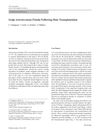Endovascular Treatment of Scalp Arteriovenous Fistula Following Hair Transplantation: Case Report
April 2022
in “
Research Square (Research Square)
”

TLDR The conclusion is that treating scalp AVF caused by hair transplantation with endovascular methods like coiling is safe and effective.
The document presents a case of a 29-year-old male who developed a rare complication, scalp arteriovenous fistula (AVF), three months after undergoing a hair transplantation procedure. The patient noticed a small pulsating mass under the skin of his forehead, which worsened over time. Diagnostic imaging revealed the presence of a scalp frontoparietal AVF. The patient underwent endovascular treatment under general anesthesia, which involved embolization with platinum detachable coils. The procedure was successful with no complications, and the patient's symptoms resolved within 3-4 weeks. A follow-up angiogram after six months showed complete disappearance of the fistula. The document concludes that while scalp AVF is a rare complication of hair transplantation, both endovascular interventions and open surgery are safe and effective treatments. A thorough preliminary angiographic study is necessary, and if the vascular anatomy is favorable, a transarterial approach can be performed. Coiling occlusion is preferred over glue embolization as it avoids skin discoloration and subcutaneous mass at the fistula point.





